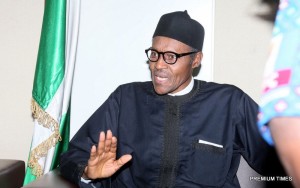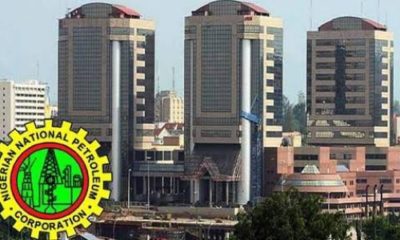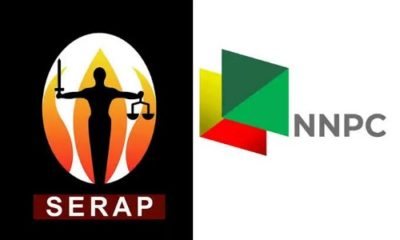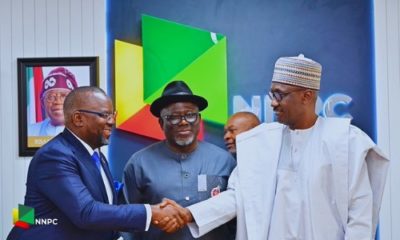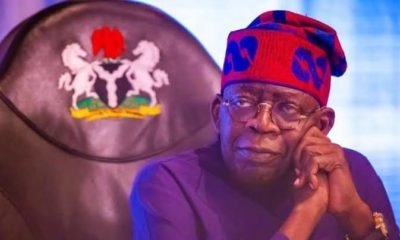Oil
Why we’re yet to move against NNPC-Pres. Buhari

ABUJA—THE Federal Government, yesterday, attributed the delay in moving against the Nigerian National Petroleum Corporation, NNPC, to efforts being made to establish the magnitude of fraud and inefficiencies in the corporation and in the oil and gas industry over the last couple of years.
Speaking in an interview on the Nigerian Television Authority, NTA’s, ‘Good Morning Nigeria,’ programme, President Muhammadu Buhari disclosed that the government was already working with some individuals that are helping it to track the destination of stolen crude oil and the accounts the proceeds were paid into.
He also reassured during the interview that only patriotic, decent and experienced Nigerians would be appointed as ministers in his government even as he lamented the state of the Air Force, which according to him could not support ground troops in the fight against Boko Haram terrorists due to lack of serviceable equipment. He said: “Frankly, I read the stories too that I intend to break up the NNPC.
I think the best way to go about it is to establish the fact of the magnitude of the inefficient way the NNPC conducted itself. When we do that we will be on a higher moral ground to carry out whatever recommendations that have been made to us.”
He maintained that the NNPC has lost track of the number of accounts it had, adding that the government was discreetly working with some Nigerians to ensure that perpetrators of fraud in the oil and gas sector were brought to book. “We have to maintain high confidentiality so that we do not put at risk some of the Nigerians that are helping us to trace some of the destinations of this stolen crude and then the accounts where they are being paid into instead of the Federal Government account.
“I do not think the NNPC knows how many accounts are outside there, which payments are being made for Nigerian crude which is really an outright theft. The money we want to intercept which have been going on for a number of years, a lot of Nigerians will not comprehend,” he explained. Offshore processing agreements Buhari lamented the fact that the crude oil swap programme and offshore processing agreements, OPA, have over the years been used to defraud the country, stating also that a number of operators in the oil and gas industry displayed lack of conscience and love for the country.
He said: “These individuals have refineries all over the world. The swapping is tied into a major killing ground for corrupt officials with an average evil to loot the country’s crude, work out how much they can bring back to us, and we pay for the transportation and for the refining. ‘The swapping programme is such a dishonest way through which Nigeria is consistently losing on daily basis, millions of dollars. I think the people who have been operating in the industry, a lot of them have displayed lack of conscience and patriotism, and only God knows the amount of damage their actions have inflicted on Nigeria.”
He expressed optimism that the United States and other European countries are willing to cooperate with Nigeria in repatriating funds that are proceeds of corruption and stolen crude. However, he stated that the Federal Government is working to ensure that it complied with the laws of these countries and provide them with the needed documents that will help expedite the repatriation. He said: “These countries are willing. I have also said that we have to comply with their system; that we have to get the documents, especially the shipping documents, and how we load from our terminals, their destinations.
It is important to note that some of them change the crude and the destinations in the high seas and then change the account it needs to be paid into. Instead of the Federal Government account, they are paid into individual accounts.
“The cooperation we need is that once we get hold of the shipping documents and we are lucky to trace them out to the countries where they sold the crude and which account it goes into and we submit the evidence in terms of loading, in terms of payments being paid into accounts other than the Federal Government account. “Once we do that, we are very willing to make sure that those accounts are frozen and the money repatriated to Nigeria. It is not an easy process, but I assure you that we are working very hard. We cannot say that we wait until everything is intact before we let you know. Whatever we are able to get in the following months or a couple of months, we will bring it out for Nigerians to know, with facts in our hands and prosecution started against those who perpetrated the unpatriotic action against Nigeria for so many years.
” Appointment of ministers On the appointment of ministers, President Buhari reassured that only patriotic, decent and experienced Nigerians would be appointed as ministers in his government. He said: “From what I have seen so far, we need really patriotic Nigerians — Nigerians that can work very hard, knowledgeable, experienced and committed Nigerians to be in charge of ministries. “A lot of the institutions of Nigeria — important institutions were compromised. Everybody was for himself and God for all of us; it’s most unfortunate.
“We have the people, educated people, experienced people but everybody seemed to be working for himself — how much he could get as quickly as possible. “We have to look for technocrats and we have to look for politicians and certainly we have to look for decent people in these classes to give them the responsibility of being in charge of ministries and important parastatals (agencies).” Air Force Lamenting the state of the Air Force, Buhari said, “Our case is lack of capacity and effective Air Force. We don’t have trained personnel.
The Air Force is virtually non-existent. The fixed-wing aircraft are not very serviceable. The helicopters are not serviceable and they are too few. We need the Air Force to conduct reconnaissance and support the ground troops. The arrangement made by the former government will soon expire. We have made this clear to the Americans and we have made it clear to G7 and we need their cooperation.”
Oil
NNPC Discovers Over 4,800 Illegal Pipeline Connections

The Nigerian National Petroleum Company (NNPC) Limited has revealed the detection of more than 4,800 unauthorized connections on oil pipelines within the country, painting a troubling image of the nation’s primary source of revenue.
Mele Kyari, the Group Chief Executive Officer of NNPC Ltd, communicated this information to the Senate Committee on Appropriations last Friday.
He said, “We have over 4,800 illegal connections on our pipelines. That means in some lines, within 100 kilometres of pipelines, you have as much as 300 insertions.
“Therefore, even when you produce the oil, you cannot deliver them at the required pressure and therefore the volume will also be less.”
As per the NNPC Ltd chief, individuals from various regions enter the Niger Delta, inserting unauthorized connections on pipelines in Nigeria’s oil-producing area.
This recent revelation follows a prior discovery of 295 illegal connections to the pipelines by the firm a year ago, underscoring the escalating issue of crude oil theft in Nigeria.
Two years earlier, Kyari had highlighted the country’s daily loss of 200,000 barrels of oil, amounting to $13 million due to theft and vandalism.
He further stated “We have two sets of losses, one coming from our products and the other coming from crude oil. In terms of crude losses, it is still going on. On the average, we are losing 200,000 barrels of crude every day.”
After the discovery, Nigeria’s security forces pledged to enhance security around the country’s pipelines.
To bolster this, the Federal Government granted a multi-billion naira pipelines surveillance contract to Tantita Security Services, headed by former militant leader Government Ekpemepulo, also known as Tompolo.
Despite facing criticism for this decision, Senator Heineken Lokpobiri, the Minister of State for Petroleum, remains convinced that it was the appropriate course of action.
In August, following a tour of oil facilities in the Niger Delta, Senator Heineken Lokpobiri expressed gratitude to Tantita, commissioned by NNPC Ltd, for their ongoing work.
He also hinted at plans for further extensive endeavors in the future.
In 2021, after extensive debate and delays, the Petroleum Industry Bill was finally passed to attract increased foreign investment into the oil sector through amendments to regulations, royalties, and taxes.
Oil
Dangote Refinery Set To Begin Fuel Production With First Crude Arrival

Nigeria’s colossal $19 billion Dangote Refinery, after encountering several setbacks, is on the verge of kickstarting fuel production.
This achievement is heralded by the arrival of the first crude shipment, transported by the OTIS tanker carrying 950,000 barrels of Nigeria’s Agbami crude.
S&P Global, citing industry sources and tanker tracking data on spglobal.com, reported the tanker’s departure on December 6, en route to Lekki, the nearest land port to Dangote’s offshore crude receiving terminal.
Scheduled to reach its destination around 8 PM on December 7, the arrival of this shipment signifies the commencement of crude supplies for the refinery’s operations.
Chartered by the state-owned Nigerian National Petroleum Company (NNPC), the Suezmax tanker is an emblem of the initial crude supply to Dangote’s cutting-edge refinery, as disclosed by a West African oil trader familiar with the matter in the S&P report.
Even though the refinery was officially completed in May, the absence of domestic crude feedstock had hindered oil product manufacturing.
To address this, the NNPC, holding a 20% stake in the refinery, struck an agreement to provide 6 million barrels of crude oil as feedstock to the Dangote refinery in December.
This move aims to jumpstart operations and overcome the previous impediments.
Agbami, operated by Chevron, holds a prominent position among Nigeria’s major deepwater developments, producing around 100,000 barrels per day in the central Niger Delta.
Known for its light sweet crude qualities, with a specific gravity of 47.9 API and a low sulfur content of 0.04%, Agbami produces substantial amounts of naphtha and kerosene.
NNPC has chartered additional shipments from different Nigerian offshore fields to the refinery, marking the start of a sequence of planned crude supplies for the month, as mentioned by the oil trader.
Located on the outskirts of Lagos, Nigeria’s commercial hub, the Dangote Refinery encountered repeated delays since its 2013 announcement, despite significant installation progress in 2019.
The refinery, designed to handle multiple crudes simultaneously, targets three Nigerian crude grades—Escravos, Bonny Light, and Forcados. When operating at full capacity, it aims to produce 327,000 barrels per day (b/d) of gasoline, 244,000 b/d of gasoil/diesel, 56,000 b/d of jet fuel/kerosene, and 290,000 metric tons per year of propane/LPG.
Dangote’s operations starting signify Nigeria’s hopes to lessen its reliance on gasoline imports, addressing the deficiencies of its existing refineries undergoing repairs. This shift is poised to reshape Nigeria’s oil industry, potentially leading to gasoline self-sufficiency by the 2040s.
Dangote officials anticipate an initial output of 370,000 barrels per day (b/d), emphasizing jet fuel and diesel production.
Industry analysts, however, project the refinery to reach its full operational capacity by mid-2025, although potential delays remain a looming concern.
Oil
NNPCL Sets Dec 2024 Terminal Date For Fuel Importation

The Nigerian National Petroleum Company Limited (NNPCL) has announced intentions to cease importing refined petroleum products by December 2024, anticipating full operational functionality for all national refineries by that time.
Group CEO, NNPC Ltd, Mele Kyari, shared this at a meeting with Speaker Tajudeen Abbas of the House of Representatives, who advocated for the privatisation of Nigeria’s refineries on Thursday.
Projections indicated the national oil firm’s revenue could climb to N4.5 trillion by the conclusion of 2023. Moreover, the rehabilitation of the Port Harcourt Refining Company, managed by NNPCL, was slated for completion by December of the current year.
Meanwhile, Oil marketers verified on Thursday that the Port Harcourt refinery is set for operations, potentially starting in January 2024. They emphasized that once operational, this refinery could notably reduce the prices of refined petroleum products.
During the meeting in Abuja, Kyari asserted Nigeria’s intention to cease importing refined petroleum products by 2024, envisioning the country’s emergence as a net exporter of these commodities within the same year.
He outlined the plans for launching operations at the Port Harcourt, Warri, and Kaduna refineries.
Kyari reiterated that all refineries would operate at full capacity, ultimately paving the way for Nigeria to transition into a net exporter of petroleum products by the conclusion of 2024.
He attributed the inactivity of Nigeria’s refineries over the years to the petroleum subsidy, emphasizing that the removal of this subsidy was drawing significant private-sector investments into the sector.
Kyari said “I can confirm to you that by the end of December this year, we will start the Port Harcourt refinery; early in the first quarter of 2024, we will start the Warri refinery and by the end of 2024, Kaduna refinery will come into operation.
“This is the commitment we are giving today and you can hold us accountable for this. In 2024, many of the initiatives including the rehabilitation of our refineries and also the efforts of small-scale refineries, and the upcoming Dangote refinery, will make Nigeria a net exporter of petroleum products in 2024.
“We will no longer be talking about fuel importation by the end of 2024. I am very optimistic that this will crystallise.
Kyari promised that by the conclusion of 2023, the government’s anticipated revenue from the company would reach N4.5 trillion, emphasizing NNPCL’s adherence to the Petroleum Industry Act and its commitment to delivering value to shareholders.
Recall that in October 2023, it was reported that Nigeria’s monthly spending on the importation of Premium Motor Spirit, known as petrol, had reached approximately N843 billion due to NNPCL’s cessation of oil swaps.
In July of this year, the Nigerian Midstream and Downstream Petroleum Regulatory Authority reported that during the post-deregulation period, spanning June 1 to June 28, 2023, the country’s total petrol consumption amounted to 1.36 billion litres, with an average daily consumption of 48.43 million litres.
The average ex-depot price of petrol, sourced solely from NNPCL as the importer, stands at about N580 per litre.
However, both NNPCL and oil marketers declared on Thursday that this substantial oil import expenditure would soon diminish.
They anticipated a drop once the Port Harcourt refinery commences production of refined petroleum products from January 2024, barring any unforeseen circumstances.

